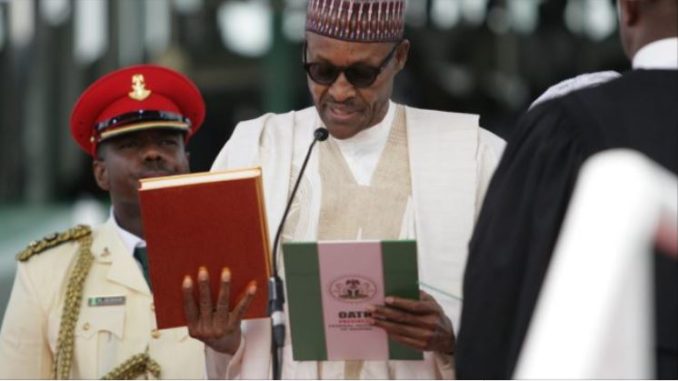
Obviously, Nigeria is not working as it should, 59 years after independence. Sundry ills beset the country: Armed robbery, kidnapping, low-intensity armed conflict, unemployment, human rights violations, widespread poverty, misapplication of public resources, rising debt burden, a snared judiciary, a castrated parliament, and a feudal executive.
In the midst of these glaring societal ills, one recurring question is the system of government that the country should adopt and practise. Does Nigeria need a new system of government? Should it be contented with the two western models, namely, parliamentary and presidential systems of government it has experimented with? Or do we need to tinker with either of them in ways that we think modern but not western; something that is laced with a grain of Afrocentricity. To be sure, we have had to revisit this question several times in our quest for a political elixir to cure the ills of the country.
The debate has been along the line of either rationalising or disavowing the benefits of both presidential and parliamentary systems of government. The parliamentary system it is argued worked for the country before it was truncated by the military in 1966. It is less expensive and somewhat representational and the government is held accountable by means of inbuilt parliamentary protocols of collective responsibility, prime minister question time and vote of no confidence.
In this system of government, parliamentarians are truly representational and accountable to their constituents. Those against this parliamentary model have argued that the smallness of the constituencies of representatives is counterproductive to the larger picture of goals and policies, as they often feel beholden to their constituencies that determine their eligibility.
Besides, it promotes schism and so-called carpet-bagging. Even the late sage, Chief Obafemi Awolowo in his liking for some form of central coordination of the state argued in his two seminal texts, Thoughts on Nigerian Constitution, and The People’s Republic that a multi-ethnic society desirous of unity should have a leadership that sees the entire country as his constituency with implication of policies and programme in terms of national reach.
And so, a presidential system of government certainly has its advantages. One of the advantages is that it provides for the election of leadership through direct national elections in ways that confer legitimacy on the leadership. The fixed tenure essentiality of a presidential system allows for stability in governance, unlike the parliamentary system that is so prone to incessant votes of no-confidence and frequent alternation in government. In the presidential system, there is an inbuilt principle of separation of powers between the three arms of government, namely, the legislature, executive and the judiciary allowing for vertical and horizontal accountability, put in other words, checks and balances unlike the fusion of powers that prevails in a parliamentary system.
But the flip side of a presidential system is varied. One is its predisposition towards authoritarianism. The president wields so much power that is hyperbolically stated that it can turn a man into a woman. As we have seen in the Nigerian case, it can easily become authoritarian, unless the independence of the other arms of government is respected.
Ironically, separation of powers is also seen as a disadvantage of the presidential system because it could be counterproductive to the smooth running of government as it could result in some strange gridlock. Worthy of note is the tenure issue. An impediment to leadership also lurks in the presidential enclave, as the country would have to wait for the tenure of the incumbent to lapse to effect a change, especially where the impeachment process is stalled. Additionally, it is expensive to run due to over bureaucratisation. It encourages a winner-take-all inclination to governance in multi-ethnic societies.
However, there is a point of order in this connection: Alexander Pope once opined, “For forms of government let fools contest; whatever is best administered is best.” In spite of the contradictions of these principal systems of government that we have experimented with, it would appear that nothing is wrong fundamentally with the systems but the state system upon which they are grafted, put in other words, the basic law of the country. It must be noted that democracy is not alien to the African worldview and traditions. We had in the past practised democracy underlined by the village system in eastern Nigerian and the checks and balances of the Oyo Empire. Still, there is the enduring Ngotla system of the Batswana in Southern Africa.
In our case, we have not had the right leadership but those that have subverted the constitutional foundation of the country. The argument is won: our multinational nature as a country prescribes for us a federal constitution and not a unitary system. The country must return to a genuine federal state structure that respects its diversity and autonomies the components parts in the context of present-day realities. Successive administrations in the prevailing republic, especially the Obasanjo and Jonathan administrations attempted to convey a national conference to resolve the crisis of the state. One was deadlocked and the other came up with some positive outcomes over which the leadership lacked the courage to implement.
We, therefore, wish to reiterate the need to restore the federal essentiality of the state. This would mean engrossing the co-coordinateness and equality of the component units of the federation including fiscal autonomy. We then net off the corruption in the system of government such as over bureaucratisation and unviable governance structures present in the polity and privilege the people as the alpha and omega of development. The fault, therefore, should be put at the doorstep of our organic law and leaders who operate it without allowing the same law to rule.
In the main, we, the people need to step forward too as active citizens to demand responsibility and responsiveness to the change we want in the current system.
END

Be the first to comment